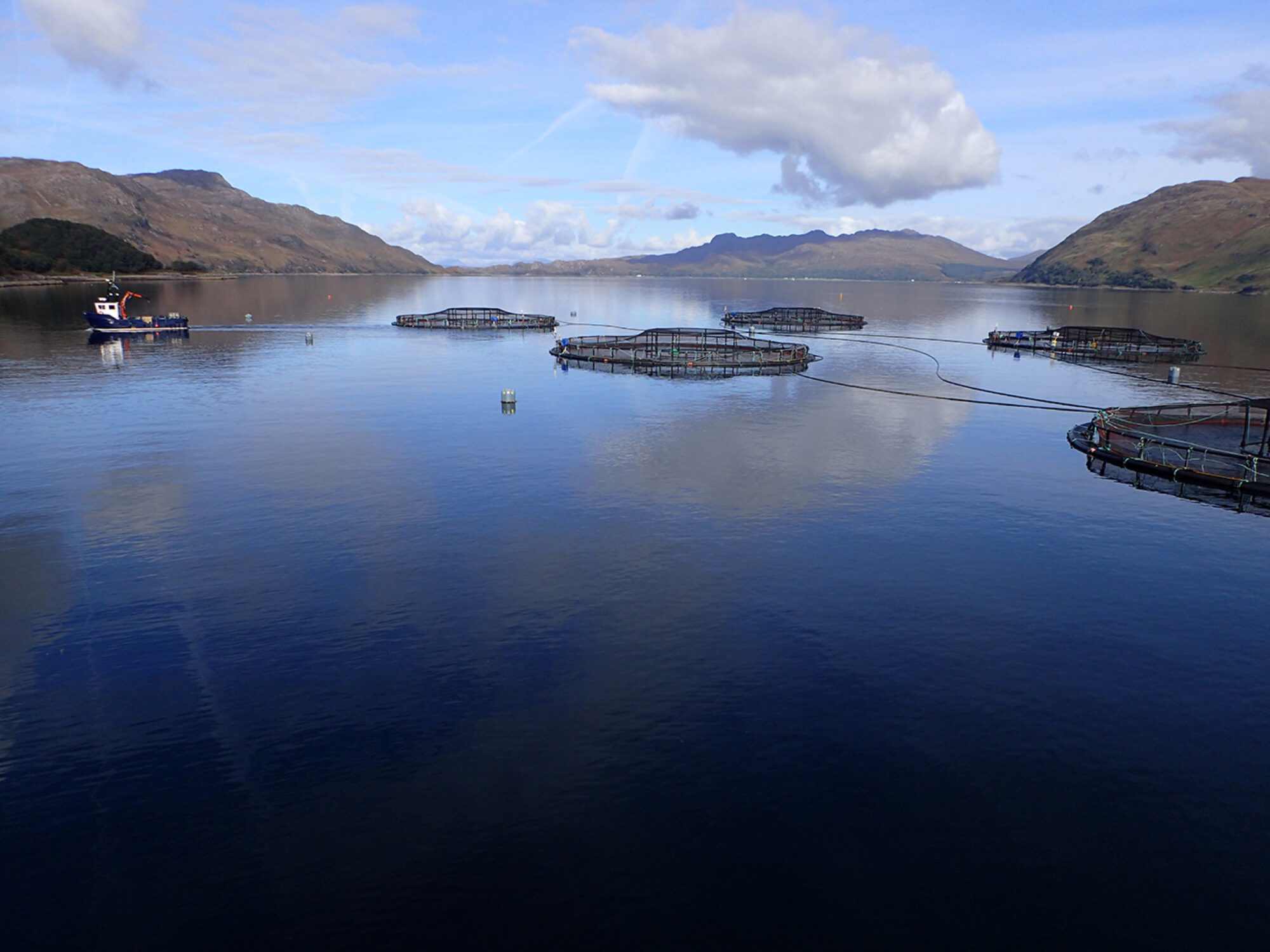
In a week-long tribute to exemplary business practices, Aquascot is ce...
Aquascot's Head of Aquaculture Ed Ley-Wilson believes in a values-led existence.
His long-held interest for the salmon industry has led him from the West Coast to Aquascot, where he is committed to developing skilled and passionate people to create genuine change in the world.
A love of the outdoors and a strong desire to live adventurously all came together in my mid to late teens, when the Highlands of Scotland became my home. Forty years on, I am still in love with this place and with the people who make it what it is and, while the journey hasn’t always been easy, it has indeed been full of adventure both at work and at play.
Following some time in the armed forces, some expeditioning in remote parts of the world and then a stint with the food producer United Biscuits down south, I found my place salmon farming up on the West Coast. Newly married and with a baby in tow, my wife and I lived a mile and a half off the beaten track with access to our tiny croft by boat or by walking the rough hill. I worked as a salmon farmer at Ardvar (we were known somewhat brutally as ‘grunts’ back then because of all the heavy lifting required), while we ran our B&B, published articles on past expeditions and, like everyone on the West Coast, did what we could to keep the wolf from the door. It was a wonderful and adventurous way to live, and our time there cemented our connection with the land and people of the West and coloured our politics to boot.
Over time, I felt the need to spread my wings a little and the result was my first stint with Aquascot back in the 1990s. As Factory Planner and then Production Manager, I faced all those same challenges we still face today – including chasing that lorry leaving at 17:0 – and I worked with some wonderful folk, some of whom are still making Aquascot tick today, twenty-five years on. After a break of self-employment, setting up various charities, chairing a Community Trust and even becoming a fireman, I find myself back at Aquascot as Head of Aquaculture. Back in 2015, the stars aligned and my farming, processing and business experience came together to enable me to take on this role – and thus the adventure continues.
At its heart, the role of the Head of Aquaculture must ensure we protect and enhance the Waitrose brand. Our client enjoys a reputation with customers as a small giant within retail. They are a relatively small player within the grocery sector, but they are a giant when it comes to creating and realising their ambition to produce great tasting food in the most sustainable fashion. As a customer, you pay a little bit more to shop at Waitrose, but there’s a reason for that, and that reason lies in the work we do to enhance their ethical and sustainability ambitions. It’s no wonder that Waitrose is overperforming in fish, with a 14% market share vs their 5% overall market share.
To protect and enhance, I must face two ways: into Waitrose and out to our farming partners. In reality, it’s a lot more complicated than that, because this interaction draws in a myriad of other players, including feed companies, academia, regulators, industry bodies, funding bodies, NGOs, veterinary specialists, specialist suppliers to the industry and more.
Aquascot’s Aquaculture team is responsible for ensuring we and our farming partners realise the Waitrose ambition as articulated in their Agricultural Strategy. We must convert that ambition into action on the ground across our farming suppliers, and with around 200 farms in the portfolio, that’s no small task. Each farming company has its own culture and its own preferred way of doing things, so a big part of my role is building relationships with people, from MDs to farm managers and staff and everyone in between.
Our on-farm Waitrose REP assessment, written and implemented by Aquascot, is a key plank in interacting with farming partners. We enjoy a unique position in the industry in visiting every farm every cycle and, as a result, we get to understand the challenges and triumphs on farms over time. We capture data on fish health and welfare, environmental impact, biodiversity, third-party certifications and human welfare, and the system is set up to encourage aspiration towards ‘excellence’. The REP was and still is a huge collaborative piece of work, involving many players to get set up and it has stood the test of time. It acts both as a window into the farming world and it promotes Waitrose and Aquascot values within.
As well as facing into Waitrose, our farming partners and the many supporting players in the industry, I also play my part in Aquascot’s Leadership Team. As such, I am responsible for contributing to the business beyond the Aquaculture piece and that manifests itself in the many initiatives underway here in Alness.
I believe in running a value-laden business and ‘value’ for me must run to more than just cash. A business must make money of course, but if that’s the only ambition then that seems a shallow existence to me. A business, our business, is as much a social enterprise as it is about making money and, as an Employee-Owned organisation, we perhaps understand that more than many. Our business is ours to shape as we deem appropriate, but it is also, at its heart, jobs. These jobs support families, keep schools open, support shops and high streets and ultimately create the communities in which we live.
And nowhere is this more evident than on our coastal communities. By purchasing Scottish salmon, we are supporting jobs in places where work has traditionally been scarce. The exodus of people from the Highlands is well documented and I worry sometimes that we focus too much on tourism as the panacea. Tourism plays a part of course but jobs are often low paid, part-time and relatively low-skilled. Second homes for tourists too is steadily emptying our remote Highland communities as local young people are priced out of affording their own home.
Salmon farms are different. They provide well-paid, year-round, high-skilled and transferable jobs to anyone keen to engage. They give families the security to settle and the result is a major contribution to creating sustainable communities up and down the Highlands and Islands. This is the kind of Highlands I want to see – thriving communities, open schools, skilled jobs, people working with our natural capital, a ‘lived landscape’ and a reversal of those clearances that have blighted our Highlands for so long. With every piece of Scottish salmon bought, our Waitrose customers are keeping schools and communities open.
Of course, you need to consider all those spill-over jobs as well – vets, mechanics, vehicle leasing companies, boat and kit manufacturers, and let’s not forget processors. Aquascot relies utterly on our farming partners, out there in all weathers and all seasons performing the difficult task of growing fish at sea. We take as much interest in aquaculture as we do in food processing and, with the Waitrose team focus on ensuring we are farming with the environment, fish and human welfare in mind, that direct engagement is as important as ever.

A salmon farm in the Nevis range area
That’s an easy one – passion. There are many qualities that go to create success of course but first amongst equals is passion. I like working with people who are passionate about the task ahead, who have a strong moral compass, resilience, strong desire to learn and who enjoy interacting with people and building long term relationships. A great EQ (emotional quotient) is key. Passion can be quietly felt of course, it doesn’t have to be extrovert, but however it’s present, it’s what drives action and carries you over those inevitable occasional bumps in the road. My colleagues Andrew Davie, Joel Ellis and Emily Purvis demonstrate all those qualities in spades.
In our team, we also need strong intellectual abilities. You need to be able to capture a lot of information quickly, form an opinion and express it when asked. We have a demanding client who wants to understand why we farm as we do and that, coupled with a dynamic ever-changing farming environment and a vociferous anti-farming lobby, means we must be on our toes at all times. I expect my team to be ‘thought leaders’, investigative in their thinking, forward in their planning and brave in facing into new challenges. Ambition too, well placed and focused on client needs, is a powerful incentive to act.
I think I’d rephrase the question a bit here and ask simply, ‘how important is it to have talented people in the business?’ And the answer of course is ‘very’. However, I believe everyone, younger or otherwise (and at 58 nearly everyone seems to be younger than me these days!), has talent. Some are realising it already, while others may have it yet to discover. I take a leaf from our MD, John Housego’s style as ‘servant leader’ here. Our job as leaders is to help others within the business realise their potential and agree pathways of work with them to support that journey. Our business needs are many and varied, and where we can build someone into a position from within, we will. However, if that potential does not exist within our current partners in the time required by our client, then yes, we would bring in new people of course.
Ensuring we have the right skills in the right place at the right time is an important strategic piece for any business. Thinking ahead to our future needs is key and the COVID crisis has demonstrated the opportunities that exist for winning good people from anywhere in the country. New people bring new ideas, different perspectives, new ways of working and a fresh pair of eyes. So, I think the answer to the question is ‘both/and’. We must provide opportunities for partners to develop from within, and we should extend our reach where we deem it appropriate too.
Interviewed by: Justine Fourny (Category & Marketing Officer)

In a week-long tribute to exemplary business practices, Aquascot is ce...


The Aquascot team are proud to join forces with SHORE Seaweed to bring...

Aquascot are once again proud to support the Highland & Islands Food &...